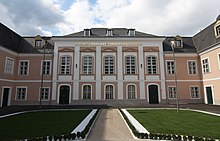International Anti-Corruption Academy
| International Anti-Corruption Academy IACA |
|
|---|---|
 Logo from IACA |
|
| English name | International Anti-Corrupton Academy |
| Seat of the organs |
Palais Kaunitz-Wittgenstein Laxenburg , Austria |
| Chair | Thomas Stelzer |
| Member States |
* 75 states * 4 international organizations |
| Official and working languages | |
| founding |
March 8, 2011 |
| www.iaca.int | |
The International Anti-Corruption Academy (IACA) is an international ( intergovernmental ) organization based in the Lower Austrian municipality of Laxenburg , around 20 km south of Vienna . It is both an international organization in the sense of international law and a post-secondary educational institution. The Academy positions itself in the global fight against corruption, to which it contributes as a competence center in the form of training and further education programs. The core mission of IACA is to provide representatives of the public and private sector with practical know-how in the area of fighting corruption. The range of training and further education programs offered by the academy includes two post-secondary master’s courses.
history
The academy was established on March 8, 2011 when the convention establishing the IACA came into force as an international organization. It is based on a cooperation between the United Nations Office on Drugs and Crime (UNODC) , the Republic of Austria and the European Anti-Fraud Office (OLAF) . During the 75th General Assembly of Interpol held in Rio de Janeiro in 2006, it was decided to found an Anti-Corruption Academy (AKA) as a training facility for anti-corruption fighters from the 186 member countries of the international police organization.
The founding conference of the IACA with the title "From vision to reality" took place in the presence of UN Secretary General Ban Ki-moon on September 2, 2010 in the Hofburg in Vienna. More than 1,000 delegates from over 120 UN member states , representatives of international organizations and important representatives from the public and private sectors took part. During the conference, 35 UN member states and an international organization signed the IACA founding agreement.
Members and Connections
The current membership is 79, including 75 member states of the United Nations and four international organizations. In addition, eleven states have signed the treaty establishing the IACA, but have not yet ratified it.
IACA has observer status at the United Nations (UN General Assembly and ECOSOC - United Nations Economic and Social Council ) and at the Group of States against corruption of the Council of Europe (GRECO). The Academy also has partnerships with numerous international institutions, such as the World Bank , the Organization of American States (OAS), the Organization for Security and Cooperation in Europe (OSCE) and the World Economic Forum .
Science and teaching
IACA sees itself as a competence center and is intended to serve as a central point of contact for corruption issues. She pursues a holistic approach: international, interdisciplinary, socially all-encompassing, integrative and sustainable. It offers seminars, trainings, workshops as well as a master's degree "Master in Anti-Corruption Studies" for participants from both the private and the public sector. Tailor-made training programs are also available on request together with other international organizations such as B. the United Nations Development Program or the Food and Agriculture Organization of the United Nations , as well as private companies. As part of the training courses offered, the problem of corruption is therefore viewed from a wide variety of perspectives and taking numerous aspects into account. The IACA is intended to offer decision-makers from the private and public sectors, international organizations and civil society an international forum for exchanging ideas and ideas in the field of fighting corruption.
Governing bodies
IACA is administered and directed by five bodies: the Board of Governors, the Conference of the Parties, the Dean, the International Academic Advisory Board and the International Senior Advisory Board. Since March 2, 2020, Thomas Stelzer has been the organization's dean and executive secretary at the same time.
Individual evidence
- ↑ a b Dean. In: www.iaca.int. Retrieved March 24, 2020 .
- ^ Waldemar Hummer: Austria as the official seat of international organizations , EU information center. 17th June 2014.
- ↑ UN message center
- ↑ Directory of members (English, last accessed on October 19, 2019)
- ^ OAS report on the partnership with IACA (last accessed on September 3, 2018)
- ↑ List of partners on the IACA website (last accessed on September 3, 2018)
- ↑ Martin Santiváñez: IACA, la academia internacional anticorrupción , El Mundo . 17th May 2013.
- ↑ Patrick Baldia: When the economy becomes a criminal offense , Die Presse . June 16, 2017.
- ↑ Information on the structure on the IACA website (last accessed on September 3, 2018)
